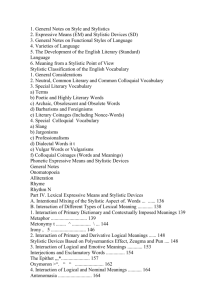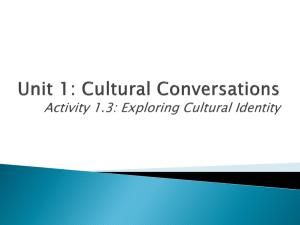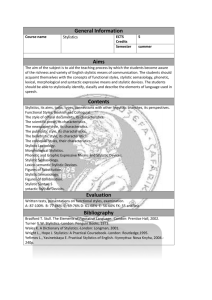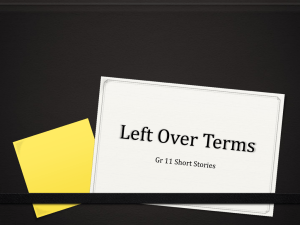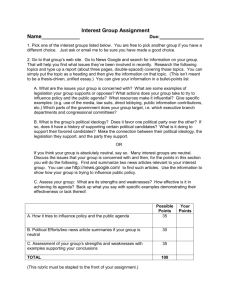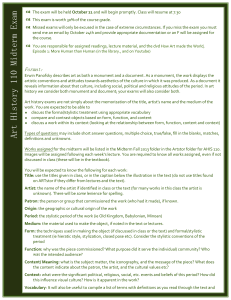Neutral words
advertisement
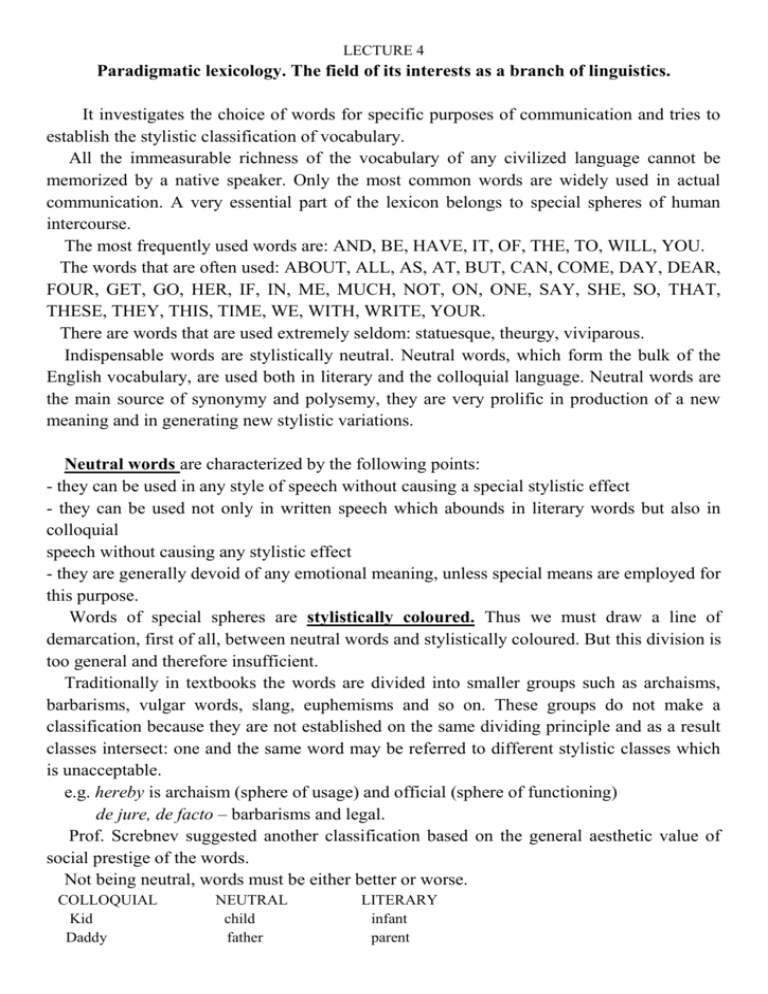
LECTURE 4 Paradigmatic lexicology. The field of its interests as a branch of linguistics. It investigates the choice of words for specific purposes of communication and tries to establish the stylistic classification of vocabulary. All the immeasurable richness of the vocabulary of any civilized language cannot be memorized by a native speaker. Only the most common words are widely used in actual communication. A very essential part of the lexicon belongs to special spheres of human intercourse. The most frequently used words are: AND, BE, HAVE, IT, OF, THE, TO, WILL, YOU. The words that are often used: ABOUT, ALL, AS, AT, BUT, CAN, COME, DAY, DEAR, FOUR, GET, GO, HER, IF, IN, ME, MUCH, NOT, ON, ONE, SAY, SHE, SO, THAT, THESE, THEY, THIS, TIME, WE, WITH, WRITE, YOUR. There are words that are used extremely seldom: statuesque, theurgy, viviparous. Indispensable words are stylistically neutral. Neutral words, which form the bulk of the English vocabulary, are used both in literary and the colloquial language. Neutral words are the main source of synonymy and polysemy, they are very prolific in production of a new meaning and in generating new stylistic variations. Neutral words are characterized by the following points: - they can be used in any style of speech without causing a special stylistic effect - they can be used not only in written speech which abounds in literary words but also in colloquial speech without causing any stylistic effect - they are generally devoid of any emotional meaning, unless special means are employed for this purpose. Words of special spheres are stylistically coloured. Thus we must draw a line of demarcation, first of all, between neutral words and stylistically coloured. But this division is too general and therefore insufficient. Traditionally in textbooks the words are divided into smaller groups such as archaisms, barbarisms, vulgar words, slang, euphemisms and so on. These groups do not make a classification because they are not established on the same dividing principle and as a result classes intersect: one and the same word may be referred to different stylistic classes which is unacceptable. e.g. hereby is archaism (sphere of usage) and official (sphere of functioning) de jure, de facto – barbarisms and legal. Prof. Screbnev suggested another classification based on the general aesthetic value of social prestige of the words. Not being neutral, words must be either better or worse. COLLOQUIAL Kid Daddy NEUTRAL child father LITERARY infant parent Chap Go on Teenager Make a move fellow continue boy/girl begin associate proceed youth/maiden commence Words that are more valuable than neutral are placed, figuratively speaking, above them and called superneutral. Words that are less valuable are called subneutral. Prof Screbnev believes that superneutral & subneutral words may be further divided into 3 degrees of elevation & degradation. The minimal degree implies absence of purpose. The speaker uses words automatically without any specific aims in view. He does not deliberately select one word or another to achieve a stylistic effect. dad, mum, fridge, маршрутка, манка, зеленка – minimal degree of degradation Minimally elevated are slightly bookish words used automatically by cultivated speakers– to refer to, in accordance with, activity, with regard to, to provide, prevail, inherent, действительность, критерий - minimal degree of elevation, these words are not used actively by non-educated speakers. The medial degree implies deliberate choice, realization of the stylistic properties of the word by its user. The speaker uses stylistically coloured words on purpose: потрясный, балдеть, stunning, knock-out (красотка) status quo, sagacity (=wisdom), somnolent (=sleepy), братоубийственный, ваятель The maximal degree is what we attribute to highly expressive words possessing either very special (uncommon) aesthetic value (superneutral words) or words inadmissible ethically (subneutral words). morn (утро) , sylvan (лесистый), maiden poor bastard, son of the beach Super Neutral Words maximal Poetic diction medial Official words minimal slightly bookish words (общелитературная лексика) Barbarisms Terms NEUTRAL maximal Subneutral Words medial minimal Colloquial words Slang Jargon Occasional words (nonce-words) Vulgar words Dialect words Professional words The status of dialect words, barbarisms and terms cannot be defined unambiguously (однозначно), it depends whether they are used on purpose (the medial degree of elevation/ degradation) or not (the minimal degree of elevation/ degradation). The borderlines between these groups are vain and to some extent depend on the individual preferences of the speaker. SUBNEUTRAL WORDS Colloquial words - They are words with a tinge of familiarity or inofficiality about them. There is nothing ethically improper in their stylistic coloring, except that they cannot be used in official forms of speech. To colloquialisms may be referred: a) colloquial words proper (colloquial substitutes of neutral words), e.g., chap (fellow), dad (father), mummy (mother), tummy (stomach), pussy (she-cat), gee-gee (horse); b) phonetic variants of neutral words: baccy (tobacco), fella (fellow), gaffer (grandfather); phonetic contractions of auxiliary and modal verbs: won’t, don’t, doesn’t, ‘ve, ‘d, ‘ll, etc. c) diminutives of neutral words: granny, daddy, piggy, as well as diminutives of proper names - Bobby, Becky, Johny; d) colloquial meanings of polysemantic words; their primary meaning refer them to the neutral sphere, while the figurative meanings place them outside the neutral sphere, making them lightly colloquial. E.g., ‘spoon’ as a colloquial word means «a man with a low mentality» (простак), a hedgehog – an unmanageable person, awfully = very. e) most interjections belong to the colloquial sphere: gee! Eh? Well, etc This does not concern the interjection ‘oh’, which is a universal signal of emotion, used both in low and high spheres of communication. Care should be taken to avoid confusing colloquial speech with the uncultivated, illiterate speech of uneducated people: we was, I goes, he ain’t coming are outside the standard lg. Jargon words. Jargon words appear in professional or social groups as informal, often humorous replacers of words which already exist in the neutral or superneutral sphere. Jargon words can be subdivided into two groups. One of them consists of names of objects, phenomena and process characteristic of the given profession opposed to the official terms of this professional sphere. Thus, professional jargonisms are unofficial substitutes of professional terms (professionalisms). They are used by representatives of the profession to facilitate the communication: звук сел, звук слетел (в речи преподавателей ин.яз. на 1 курсе языкового вуза), tin-fish (shipping) – submarine block buster (military)– a bomb especially designed to destroy blocks of big buildings piper (cooking) – a specialist who decorates pastry with the use of a cream pipe a midder case (judiciary)- a midwifery case outer (boxing) – a knockout blow. The second group is made up of words used to denote non-professional thing relevant for representatives of the social group with common interests (e.g., school jargon, students’ jargon, criminal jargon, etc.). Soldier’s jargon: a sewing machine – пулемет. School jargon -to cut classes (to miss classes), stinks (chemistry). a bird (опытный пилот), an egg (курсант, не совершивший ни одного полета), In literary works jargonisms indicate to the fact that the speaker belongs to a certain professional or social group. Slang is the part of the vocabulary made by commonly; understood and widely used words and expressions of humorous kind - intentional substitutes of neutral and elevated words and expressions. The psychological source of its appearance and existence is striving for novelty in expression. Many words and' expressions now referred to slang originally appeared in narrow professional groups; since they have gained wide currency, they must be considered as belonging to slang. Bags of (=many), apple – мяч, grapes – шампанское, idiot box – телевизор, worms лапша , worms in blood – макароны в томатном соусе, killer – сигарета, tornado juice – дешевое виски. Slang is very rich in synonyms: money – jack, tin, brass, slippery stuff, a red-haired man – brick top, carrot head, carrot head, a beautiful girl – dish, angel, angel cake, cutie, ankle. In creation of slang various figures of speech take part: the upper storey (head) metaphor; skirt (girl) - metonymy; killing (astonishing) - hyperbole; whistle (flute) understatement; clear as mud - irony. Sometimes slang words are just invented: shinanigan (trifles, nonsense). Nonce-words are defined as chance words, occasional words, words created for the given occasion by analogy with the existing words by means of affixation, composition, conversion, etc. E.g., «There was a balconyful of gentlemen...» (the word balconyful was coined by analogy with the words «mouthful», «spoonful», «handful»). Being non-existent, unknown, yet comprehensible in the given situation, such words produce humorous effect. I love you mucher. Plenty mucher? Me tooer. Being used just once, they disappear completely. Vulgar words. This is a stylistically lowest group of words which are considered offensive for polite usage. They may be subdivided into two groups: 1) lexical vulgarisms (words expressing ideas considered unmentionable in a civilized society. It is, so to speak, the very lexical meaning of such words which is vulgar). 2) stylistic vulgarisms ( words the lexical meanings of which have nothing indecent or improper about them. Their impropriety in civilized life is due solely to their stylistic value to stylistic connotation expressing derogatory attitude of the speaker towards the object of speech): морда, харя, smeller (нос), pay dirt (деньги), old bean (старый хрыч). In real life vulgar words help to express emotions, emotive and expressive assessment of the object spoken about. When used in works of literature they perform the function of characterization. If used too frequently, vulgar words lose their emotional quality and become mere expletives (e.g., «You are so darn good-looking»). Dialect Words. Against the background of the literary language dialect words as dialect peculiarities of speech are stylistically relevant. They show the social standing of the speaker. Nowadays it is only in the speech of the people deprived of proper school education forms of speech are signs of provincialism. When these words are used in emotive prose they are meant to characterize the speaker as a person of a certain local origin, breeding and education. Some dialectal words have become familiar in good and standard colloquial English and are universally accepted. e.g. lass (Scottish)– beloved girl; lad – young man; daft – silly mind; fash – trouble; cutty – naughty girl; tittie – sister; hinny – honey; Australian: brekky – breakfast, mossie – mosquito, Oz – Australia, Pommie – a Britisher, postie – postman On the whole dialects differ from the literary language most of all in the sphere of phonetics and vocabulary. Of special significance for English literature is the so-called Cockney - the dialect of the uneducated people in London: e.g. to sy, to py instead of «to say», «to pay». SUPERNEUTRAL WORDS Slightly bookish words (общелитературная лексика) - words of minimal degree of aesthetic value, used in official and non-official speech: considerate, significant, emphasize, proposition, consequence. Bookish words. These words belong to that stratum of the vocabulary which is used in cultivated speech only - in books or in such special types of oral communication as public speeches, official negotiations, etc. They are mostly loan-words, Latin and Greek. They are either high-flown synonyms of neutral words, or popular terms of science. Bookish words are stylistically coloured and used on purpose: patriarchal, parental, efflorescence, hierarchy, heritage, ecclesiastical. Consider the following example: A great crowd came to see ~ A vast concourse was assembled to witness. Began his answer - commenced his rejoinder. Official words – words of medial degree of elevation, used deliberately in office work & official correspondence: aforementioned, heretofore, herein, status quo, de facto. Poetic diction – words of maximal degree of elevation, used in poetry and high-flown prose: woe (sorrow), realm (kingdom), quoth (said), sylvan (woody). Mane poetic words are archaic. Archaisms. This term denotes words which are practically out of use in present-day language and are felt as obsolete. Archaisms may be subdivided into two groups. The first group is represented by «material archaisms», or «historical archaisms» -words whose referents have disappeared. By-gone periods of any society are marked by historical events, institutions, customs, which are no longer in use: yeoman, goblet, baldric, mace. Such words never disappear from the language – they are historic terms. Archaic words are mainly used in creation of a realistic background of historical novels. The second group is formed by archaisms proper - those words which have been ousted by their synonyms: are (before), albeit (though), billow (wave), thy (your) поэт. Archaisms are frequently to be founding the style of official documents: in business letters, legal language, diplomatic documents – aforesaid, hereby, therewith, herein. The function of archaic words in documents is terminological in character. Archaic words also help to create an elevated effect. In poetry archaisms are used to create romantic atmosphere, the general colouring of elevation. Terms – neutral in professional sphere and of medial degree of elevation in fiction or other non-professional sphere: ulcerative colitis (medical), synecdoche (linguistic), synchrophasotron (physics). Barbarisms – words borrowed from other languages and not assimilated. They are words whose foreign look or foreign sound or both have been preserved, although they are widely used in English. They are mostly late borrowings from French (bouquet, garage, idee fixe) or Latin (alter ego, alma mater). In the speech of personages like Hercule Poirot, who is a foreigner, barbarisms are used without any purpose that is they refer to minimal degree of elevation. But when they are used in fiction and aimed at creating the personage’s speech portrait, they belong to medial degree of elevation. Sometimes in speech barbarisms are used as they are perceived as more exquisite or elegant. In this case they are also classified as words medial degree of elevation: tet-a-tet, aurevoir, bonjour, et cetera. Functions of superstandard words in fiction are different in author’s speech and in personage’s speech. In author’s speech bookish and slightly bookish words have exceptionally functional meaning and are a feature of bookish speech. Words of more specific character are used to create certain colouring: local, historical, professional, etc. In personage’s speech words of elevated aesthetic value, except slightly bookish words, serve for speech characteristic. Mixture of styles – a stylistic device, based on the use of subneutral & superneutral words in close context, often in the form of translation from high-flown to low colloquial sublanguage or vice versa. It always has comic effect: “I say, old boy, where do you hang out?” Mr. Pickwick responded that he was at present suspended at the Gearge and Vulture (Ch. Dickens). Phraseological units and their stylistic use. Phraseological units possess rhythmic properties, figurativeness (образность) & expressiveness that is why they are used with stylistic purposes. They are more expressive than their neutral equivalents. Let’s go and leave this place forever vs let’s go and shake the dust of this place for good. The most effective stylistic devices are different types of violation of phraseological units with the aim of creating emphasis or humorous connotations. Despite their stability, phraseological units are easily broken by some lexical element which is either added or substituted. The substitution of a component element may be achieved by a synonym or an antonym, by a word with a resembling sound form, or by any word prompted by the context or by the writer’s intention. These substitutions are always occasional and unpredictable, e.g. Every country on the old continent has a fine collection of skeletons in the cupboard. У всех европейских стран есть немало неблаговидных тайн, которые они скрывают от других. The stylistic device of violation of phraseological units consists in making each word of the combination acquire its literal meaning which, of course, in many cases leads to the realization of an absurdity. In the sentence "It was raining cats and dogs, and two kittens and a puppy landed on my window-sill" (Chesterton) the set expression ‘to rain cats and dogs’ is freshened by the introduction of "kittens and a puppy," which changes the unmotivated combination into a metaphor which in its turn is sustained. Often the key-words of well-known phrases are purposely replaced: Fact forbid! (instead of “God forbid!” Dickens) The Gilded Age ((instead of “The Golden Age!” M. Twain) Interaction of Stylistically Coloured Words and the Context The following general rules of stylistic interaction may be stated: 1. An elevated word placed in a stylistically neutral context imparts the latter a general colouring of elevation, i.e. makes the whole utterance solemn or poetic, provided the subject of speech is consistent with the stylistic colouring of elevation. 2. An elevated word in a neutral context produces an effect of comicality if the subject of speech or the situation is inconsistent with elevated colouring. 3. Sub-neutral words in a neutral context lower the stylistic value of the whole. 4. Sub-neutral words in a super-neutral context or vice versa produce a comic effect. Questions: 1) What is the subject-matter of paradigmatic lexicology? 2) How can words be classified according to their frequency of usage? 3) What words form the core of the English vocabulary? What are their characteristics? 4) What words are opposed to neutral ones? Is that division sufficient? 5) What is the traditional classification of words? 6) 7) 8) 9) 10) 11) 12) 13) 14) 15) 16) 17) 18) 19) 20) 21) 22) 23) 24) 25) 26) 27) 28) 29) 30) 31) 32) 33) 34) 35) 36) 37) 38) 39) 40) 41) 42) Why is it inconsistent? Give examples. What is Prof. Screbnev’s classification of words based on? What are the two groups of stylistically coloured words? What sub-division of super-neutral (elevated) and subneutral (degraded) words was suggested by Prof. Screbnev? What arte distinctive features of each level? What is the subdivision of sub-neutral words? Are colloquial words used with stylistic intention or without one? What kind of words are referred to as colloquialisms? What are jargonisms? What are the two types of jargonisms? What is slang? What is the connection and difference between jargon and slang? What is the stylistic function of slang? Why is slang rich in synonyms? What are the linguistic sources of slang? What are nonce-words? What is their stylistic function and intention? How are nonce-words formed? Give examples. What is the linguistic definition of vulgarisms? What are lexical vulgarisms? What is the stylistic function of vulgarisms? What is the stylistic function of dialect words? What kind of words does the elevated vocabulary comprise? In what spheres of communication are bookish words used? What is the origin of most bookish words? What words are referred to poetic diction? What are archaic words? Why do they become obsolete? What are historical archaisms? What is their function in imaginative prose? in poetry? in official speech? What is the difference between a borrowed word and a foreign word proper (barbarism)? What is the stylistic function of foreign words? What is their stylistic status? What does the term “mixture of styles” denote? What is the stylistic effect of the use of elevated words in a neutral (sub-neutral) context? Sub-neutral words in a neutral context? When are dialectisms and professionalisms stylistically coloured? How are phraseological units differentiated stylistically? What stylistic effect do they impart to the text? What does violation of phraseological units consist in? Give examples.
